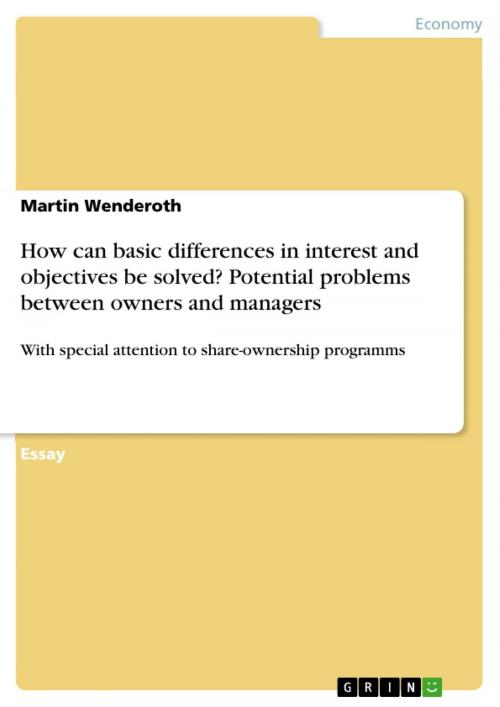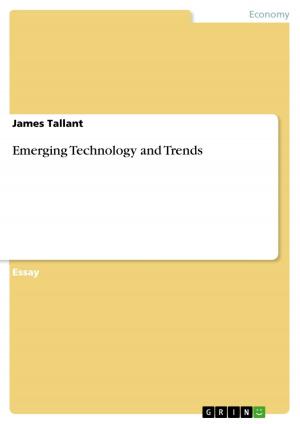How can basic differences in interest and objectives be solved? Potential problems between owners and managers
With special attention to share-ownership programms
Business & Finance, Management & Leadership, Management| Author: | Martin Wenderoth | ISBN: | 9783640267286 |
| Publisher: | GRIN Publishing | Publication: | February 13, 2009 |
| Imprint: | GRIN Publishing | Language: | English |
| Author: | Martin Wenderoth |
| ISBN: | 9783640267286 |
| Publisher: | GRIN Publishing |
| Publication: | February 13, 2009 |
| Imprint: | GRIN Publishing |
| Language: | English |
Essay from the year 2008 in the subject Business economics - Business Management, Corporate Governance, grade: (4) good, University of Pécs (International PhD Program), course: Business Economics, 19 entries in the bibliography, language: English, abstract: A recent study of Kienbaum Human Resource Consultancy analysed the development of sal-ary increases of Top Managers in the past 30 year. (Author unknown, 20071, p.23). The result: The income of Top Managers in the 100 biggest German stock companies increased on aver-age from 1976 till 2005 from ? 225,000 to ? 1,8 millions, representing a compound annual growth rate of 7.45%. [...] Salaries like the ones from the previous illustration, as well as big premium packages are worldwide a subject of criticism among investors. Even in the United States, some of the so-called 'Fat Cats' are already seen as shysters (Eberle, M. Heilmann, D. Fockenbrock, D., 2007, p.15). Being rich and having a high income is part of the American Dream and as such not a big subject of jealousy. However, the Americans do also appreciate fairness, which is the reason why many Americans react allergically to such high incomes, especially when they assume, that the income doesn't match with achievements of those receiving the money. Un-der consideration of the accounting scandals in the previous years (e.g. Enron), high rates of unemployment and poor wage agreements, the income level of top managers has to become in line with their achievements and results (Riecke, T. 2007, p.2). The present assignment will discuss the potential problems between owners and managers of organisation and how gaps between the specific interests can be closed. The following part will lay the theoretical foundation, by highlighting the Principal-Agent Theory. Part three of this assignment will evaluate approaches of how the already mentioned gap can be closed. By doing so, special attention will be paid to share-ownership programmes. Finally, the author of this assignment will summarise the findings and draw his conclusions.
Essay from the year 2008 in the subject Business economics - Business Management, Corporate Governance, grade: (4) good, University of Pécs (International PhD Program), course: Business Economics, 19 entries in the bibliography, language: English, abstract: A recent study of Kienbaum Human Resource Consultancy analysed the development of sal-ary increases of Top Managers in the past 30 year. (Author unknown, 20071, p.23). The result: The income of Top Managers in the 100 biggest German stock companies increased on aver-age from 1976 till 2005 from ? 225,000 to ? 1,8 millions, representing a compound annual growth rate of 7.45%. [...] Salaries like the ones from the previous illustration, as well as big premium packages are worldwide a subject of criticism among investors. Even in the United States, some of the so-called 'Fat Cats' are already seen as shysters (Eberle, M. Heilmann, D. Fockenbrock, D., 2007, p.15). Being rich and having a high income is part of the American Dream and as such not a big subject of jealousy. However, the Americans do also appreciate fairness, which is the reason why many Americans react allergically to such high incomes, especially when they assume, that the income doesn't match with achievements of those receiving the money. Un-der consideration of the accounting scandals in the previous years (e.g. Enron), high rates of unemployment and poor wage agreements, the income level of top managers has to become in line with their achievements and results (Riecke, T. 2007, p.2). The present assignment will discuss the potential problems between owners and managers of organisation and how gaps between the specific interests can be closed. The following part will lay the theoretical foundation, by highlighting the Principal-Agent Theory. Part three of this assignment will evaluate approaches of how the already mentioned gap can be closed. By doing so, special attention will be paid to share-ownership programmes. Finally, the author of this assignment will summarise the findings and draw his conclusions.















